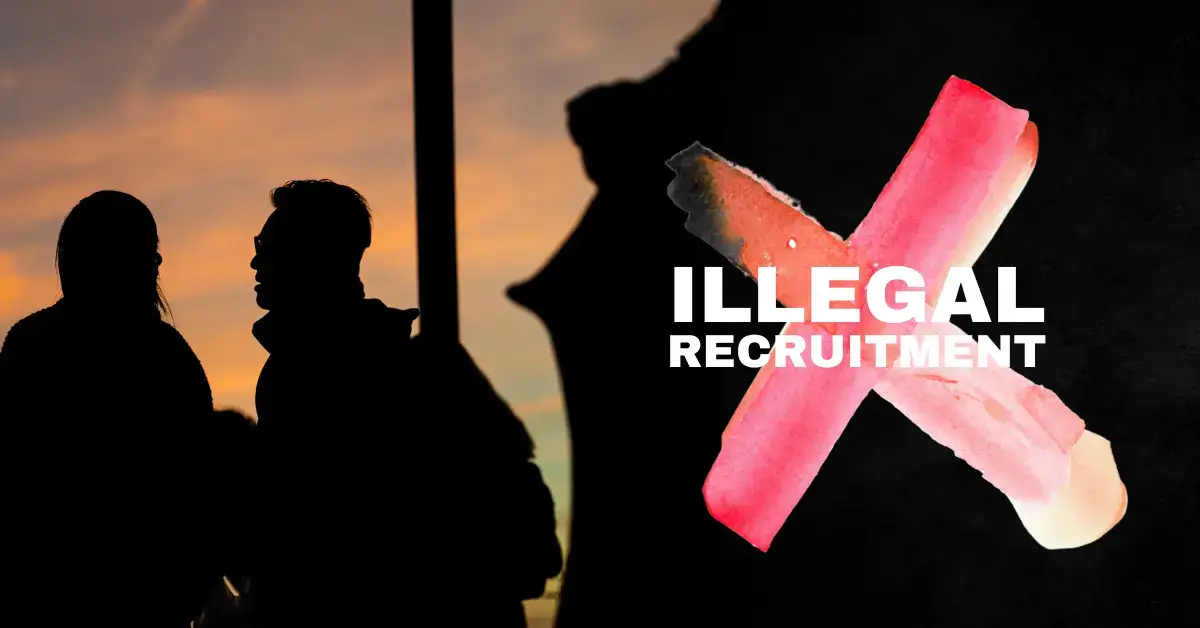According to recent data, over 2.2 million Filipinos work overseas, but competition for quality positions remains fierce with only about 30% of applicants successfully securing their target positions. For Overseas Filipino Workers (OFWs), job interviews represent a critical gateway to better opportunities and financial stability for themselves and their families back home.
The journey to securing an overseas position comes with unique challenges that domestic job seekers don’t face. Language barriers, cultural differences, unfamiliar job interview formats, and complex documentation requirements can make the process intimidating even for experienced professionals.
This comprehensive job interview guide combines insights from successful OFWs, professional recruiters, and international hiring managers to equip you with everything you need to stand out in your next overseas job interview. Whether you’re a first-time applicant or looking to advance your international career, these strategies will help you present your best self and increase your chances of success.
By the end of this guide, you’ll understand how to prepare effectively, navigate cultural differences, answer challenging questions with confidence, and follow up professionally. Let’s begin your journey to international career success!
OFW Interview Readiness Assessment
Test your knowledge and preparation level for overseas job interviews with this 10-question assessment. Select the best answer for each question.
This quiz will help you identify areas where you might need additional preparation before your international job interview.
Understanding the OFW Job Interview Process
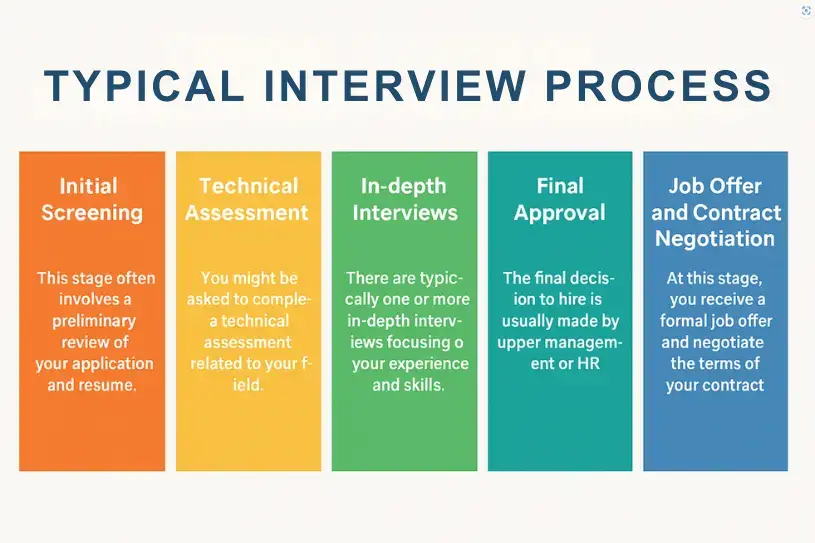
The path to securing an overseas position typically follows a more complex and lengthy process than local employment opportunities. Understanding this journey helps you prepare strategically and manage your expectations.
The Typical Stages of International Job Interviews
Most OFWs will navigate the following job interview stages:
- Initial Screening: Usually conducted via phone or email to verify basic qualifications and language proficiency.
- Technical Assessment: Depending on your field, you may need to complete skill tests, case studies, or practical demonstrations to prove your expertise.
- In-depth Interviews: These could be virtual or in-person and often involve multiple rounds with different stakeholders, including potential supervisors, HR representatives, and sometimes even future colleagues.
- Final Approval: This may include background checks, reference verification, and medical examinations specific to your destination country.
- Job Offer and Contract Negotiation: The final stage where terms are discussed and finalized.
Our recruitment team has witnessed firsthand that the journey from application to job offer typically spans 2-3 months for most OFW positions. According to Unistaff, specialized roles in healthcare, engineering, or executive positions may take longer due to additional verification and regulatory requirements.
How Overseas Interviews Differ from Local Interviews
International employers evaluate candidates differently than Philippine employers:
- Greater emphasis on adaptability: They want to know you can thrive in a new cultural environment.
- Stricter verification processes: Your credentials, work history, and legal documentation will be scrutinized more thoroughly.
- Higher language proficiency standards: Many positions require demonstrable English or local language skills beyond basic conversation.
- Cultural fit assessment: Employers are evaluating whether you’ll integrate well with their organizational culture and local customs.
Essential Documentation to Prepare
Before applying, ensure you have these documents ready and properly organized:
- Updated passport with at least 12 months validity
- Professional resume/CV tailored to international standards
- Educational diplomas and transcripts
- Professional licenses and certifications (with authentication when required)
- Employment certificates from previous employers
- Government-issued IDs
- Professional references with current contact information
- Recent professional photographs (according to destination country requirements)
Researching Potential Employers
To avoid scams and ensure you’re pursuing legitimate opportunities:
- Verify the employer with the Department of Migrant Workers (DMW)
- Research the company through their official website, LinkedIn profile, and business registries
- Search for employee reviews on platforms like Glassdoor or Indeed
- Connect with current or former employees through professional networks
- Verify the recruitment agency’s DMW license if applying through an agency
Essential Pre-Interview Preparation for OFWs

In our years of conducting overseas hiring, we’ve consistently seen that thorough preparation directly correlates with job interview success. Candidates who methodically prepare their responses, research the company culture, and practice their presentation consistently outperform equally qualified applicants who prepare minimally. According to Workable’s interview guide, candidates who spend at least 7-10 hours preparing for their job interviews are 2.6 times more likely to receive job offers than those who prepare minimally.
Researching Your Target Country’s Work Culture
Each country has distinct business practices and expectations:
- Middle East: Hierarchical structures with formal communication. Punctuality is highly valued, and religious considerations may impact work schedules.
- Singapore/Hong Kong: Fast-paced environments with emphasis on efficiency and results. Work ethic and productivity are primary concerns.
- Europe: Often values work-life balance, collaborative approaches, and independence in problem-solving.
- North America: Typically prizes initiative, innovation, and direct communication styles.
Dedicate time to understanding these nuances by reading country-specific guides, watching videos from expats in your destination, and connecting with fellow Filipinos already working there.
Document Preparation and Organization
Create a comprehensive document portfolio:
- Organize physical and digital copies of all certificates and IDs
- Have documents translated if required by your target country
- Prepare multiple copies of frequently requested documents
- Create a simple system to quickly locate specific documents during job interviews
- Store digital copies in cloud storage for easy access
Aligning Your Experience with the Job Description
Carefully analyze the job posting to understand exactly what the employer is seeking:
- Highlight experiences that directly match their requirements
- Prepare specific examples that demonstrate your relevant skills
- Quantify your achievements with numbers when possible (e.g., “Increased productivity by 25%”)
- Identify transferable skills if changing industries
- Practice explaining how your background makes you an ideal candidate
Salary Research and Negotiation Preparation
Research typical compensation packages for your role in the specific country:
- Understand the local cost of living
- Know the typical benefits provided to expatriate workers
- Prepare a realistic salary range based on your qualifications
- Consider the total package including housing, transportation, and healthcare
- Understand local tax implications for OFWs
Technical Skills Assessment
Many international positions require proving your technical capabilities:
- Review fundamental concepts in your field
- Practice common technical questions for your industry
- Prepare to demonstrate software proficiency if relevant
- Create a portfolio of your work if applicable
- Consider obtaining additional certifications valued internationally
Mastering Virtual Interviews: A Critical Skill for OFWs

From reviewing thousands of virtual interviews, our team has identified technical difficulties as a major stumbling block for otherwise exceptional candidates. Poor lighting, unstable internet connections, and audio issues create immediate negative impressions that are difficult to overcome. TrueProfile.io emphasizes that poor technical setup is one of the top reasons qualified candidates fail at the virtual job interview stage.
Setting Up a Professional Virtual Environment
Create an optimal setting for your video job interview:
- Choose a quiet location with minimal background noise
- Ensure your background is clean, uncluttered, and professional
- Position your camera at eye level for the most flattering angle
- Face your primary light source rather than having it behind you
- Test your internet connection in advance and have a backup plan (mobile data, alternative location)
Technical Preparation
Prevent common technology issues:
- Test your camera, microphone, and speakers 24 hours before and again 1 hour before
- Download and familiarize yourself with the job interview platform (Zoom, Teams, Skype, etc.)
- Close unnecessary applications to ensure your device runs smoothly
- Have a phone charged and ready as backup if technical issues arise
- Position chargers and equipment where they won’t be disturbed during the job interview
Professional Appearance and Body Language
For virtual job interviews:
- Dress professionally from head to toe (you may need to stand unexpectedly)
- Choose solid colors over patterns, which can distort on camera
- Practice looking at the camera rather than at your own image
- Sit with good posture and position yourself to take up about 2/3 of the frame
- Minimize hand gestures that might appear exaggerated on video
Handling Time Zone Differences
When interviewing with employers many time zones away:
- Double-confirm the job interview time in both your local time and the employer’s time
- Adjust your schedule 2-3 days before to align with the job interview time if possible
- Schedule the job interview during your peak alertness hours when you have options
- Keep a clock visible with both your time and the interviewer’s time zone
- Have a light meal before late night or early morning interviews to maintain energy
Practice Sessions
Conduct realistic mock interviews:
- Ask a friend to conduct practice interviews using the same platform
- Record yourself answering common questions to review your presentation
- Practice sharing your screen if you’ll need to present documents or portfolios
- Simulate potential technical issues to practice troubleshooting calmly
- Time your answers to ensure you’re concise but comprehensive
Cultural Intelligence: Adapting to Your Target Country

Your ability to demonstrate cultural awareness and adaptability can significantly impact hiring decisions. Employers want assurance that you’ll integrate successfully into both their organizational culture and the local environment.
Understanding Cultural Norms in Common OFW Destinations
Middle East:
- Business interactions tend to be formal and hierarchical
- Building relationships before business is highly valued
- Gender roles may differ significantly from Philippine norms
- Religious practices influence business schedules and customs
- Patience in negotiations and decision-making is expected
Singapore/Hong Kong:
- Direct communication styles with an emphasis on efficiency
- Punctuality is crucial—being even 5 minutes late is considered disrespectful
- Saving face and maintaining harmony in professional relationships
- Competitive work environments with high performance expectations
- Multicultural workplaces requiring adaptability to diverse teams
Europe:
- Work-life balance is typically prioritized
- More egalitarian workplace structures in many countries
- Direct feedback is common and not considered rude
- Socializing with colleagues may be an important part of work culture
- Varying holiday traditions and vacation expectations by country
North America:
- Value placed on individual initiative and proactive problem-solving
- Casual communication styles even in professional settings
- Emphasis on innovation and continuous improvement
- Directness in communication valued over indirect approaches
- Strong focus on measurable results and productivity
Communication Style Adjustments
Prepare to adapt your communication approach:
- Understand appropriate levels of formality in different cultures
- Learn basic greetings in the local language when possible
- Research appropriate topics for small talk in your target country
- Adjust your pace of speaking if needed (some cultures prefer faster or slower speech)
- Practice the appropriate level of assertiveness valued in your destination
Appropriate Dress Codes
Professional appearance standards vary significantly:
- Research country-specific business attire expectations
- Err on the side of formality for first impressions
- Consider climate and cultural sensitivities in your choices
- For women, understand varying expectations regarding makeup, jewelry, and modest dressing
- Have multiple professional outfits prepared for multi-day job interview processes
Building Rapport Across Cultures
Develop strategies for connecting with international interviewers:
- Research common interests or topics valued in the culture
- Learn appropriate greetings and professional gestures
- Practice active listening techniques that demonstrate respect
- Understand humor differences (what’s funny in the Philippines may not translate well)
- Demonstrate genuine curiosity about the culture without stereotyping
Answering Common OFW Job Interview Questions

Our interview coaches always emphasize structured storytelling when preparing candidates. Having concrete examples that clearly outline the situation, your specific responsibilities, actions taken, and measurable results provides compelling evidence of your capabilities. The Muse recommends using the STAR method (Situation, Task, Action, Result) when answering behavioral questions to provide structured, compelling responses.
“Why do you want to work overseas instead of in the Philippines?”
This question assesses your motivation and commitment. Strong answers typically include:
- Professional growth opportunities not available domestically
- Specific skills or technologies you wish to master
- Long-term career goals that international experience supports
- Genuine interest in the culture and country (without criticizing the Philippines)
- Financial goals tied to specific life plans
Sample answer: “While I’ve gained valuable experience in the Philippines, working internationally at a company like yours offers exposure to advanced technologies and global best practices in my field that aren’t yet widely implemented domestically. I’m particularly excited about your company’s leadership in [specific area] and see this as an opportunity to develop expertise that will benefit my long-term career growth while allowing me to contribute immediately to your team’s objectives.”
“How will you handle homesickness and cultural adjustment?”
Employers want assurance you’ll remain stable and productive despite being far from home:
- Describe previous experiences adapting to new environments
- Outline specific strategies for maintaining well-being
- Mention technology for staying connected with family
- Discuss your interest in building a local community
- Emphasize your resilience and problem-solving approach
Sample answer: “I’ve prepared for this transition by connecting with fellow Filipinos already working in [country] to understand their adjustment process. While I’ll certainly miss my family, I’ve established regular video call schedules and planned visits during major holidays. I’m also excited to immerse myself in local culture by joining community groups and exploring the area. During my university studies, I lived away from home for four years and developed effective strategies for maintaining my well-being while building new relationships.”
“What skills make you valuable as an international employee?”
Focus on qualities particularly relevant to overseas work:
- Adaptability and flexibility in changing circumstances
- Communication skills across cultural differences
- Technical expertise that transfers across borders
- Problem-solving abilities in unfamiliar situations
- Emotional intelligence and cultural sensitivity
Sample answer: “Beyond my technical qualifications, I bring strong adaptability developed through working with multinational clients in my current role. I’ve consistently demonstrated the ability to adjust communication styles to build rapport with diverse stakeholders. Additionally, my experience streamlining documentation processes reduced our department’s processing time by 30% – a skill that would transfer well to your organization’s objectives. I’m also conversationally proficient in [relevant language], which I’ve been studying for the past year in preparation for international opportunities.”
“Tell us about your experience working with diverse teams”
Provide concrete examples that demonstrate cultural competence:
- Describe specific multicultural projects or teams
- Highlight how you navigated cultural differences successfully
- Discuss lessons learned from cross-cultural experiences
- Explain how diversity improved outcomes
- Show appreciation for different perspectives
“How do you plan to overcome language barriers?”
Demonstrate proactive preparation and problem-solving:
- Discuss your current language learning efforts
- Explain communication strategies when facing language challenges
- Mention technological tools that can assist with translation
- Emphasize non-verbal communication skills
- Share examples of successfully navigating language differences
Professional Presentation: Dressing and Grooming Tips
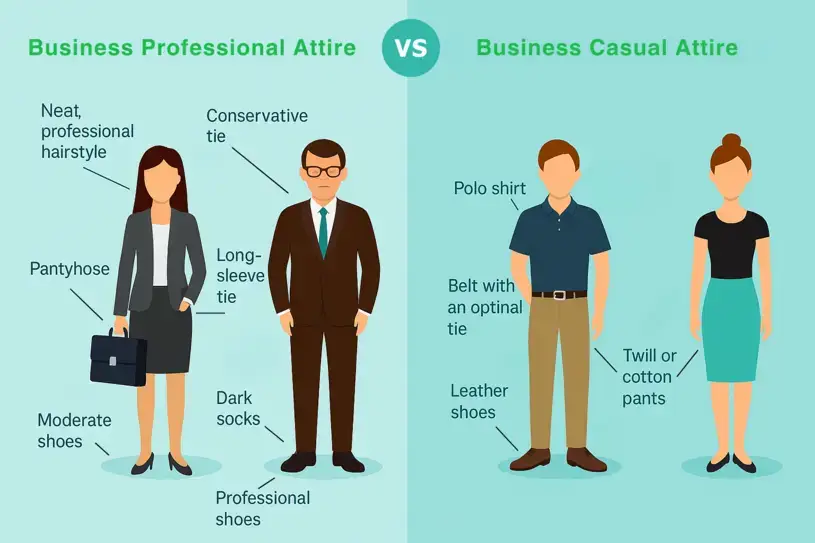
Through our extensive recruitment experience across multiple countries, we’ve observed how seemingly minor presentation details often become deciding factors between equally qualified candidates. Professional appearance signals respect for the opportunity and attention to detail that employers value highly. According to GMA Network’s OFW Guide, seemingly minor presentation details can significantly impact hiring decisions for international positions.
Professional Attire Guidelines
For most international business settings:
- Men: Conservative business suit in navy, gray, or black; long-sleeved dress shirt; coordinated tie; polished dress shoes
- Women: Business suit with skirt or trousers; conservative blouse; closed-toe professional shoes; minimal jewelry
- All genders: Well-maintained, simple accessories; portfolio or professional bag (not backpacks); minimal or natural-looking makeup
Cultural Considerations in Appearance
Adjust your presentation based on regional expectations:
- Middle East: More conservative attire, especially for women; often includes covered shoulders and knees
- Asia: Neat appearance highly valued; conservative but stylish business attire
- Europe: Varies by country but generally values quality over quantity in business wear
- North America: Business casual acceptable in many industries; research company culture specifically
What to Bring to Your In-Person Job Interview
Prepare a professional job interview kit:
- Multiple copies of your resume/CV
- Portfolio of relevant work (if applicable)
- List of references
- Notepad and professional pen
- Original and photocopies of relevant certificates
- Business cards if you have them
- Simple, professional bag or portfolio case
- Emergency grooming items (breath mints, comb, etc.)
First Impression Tactics
The critical first moments of your job interview:
- Arrive 15-20 minutes early but enter the office only 5-10 minutes before
- Turn off your phone completely before entering
- Greet everyone respectfully, including receptionists and assistants
- Offer a firm handshake when culturally appropriate
- Make appropriate eye contact based on cultural norms
- Wait to be invited to sit down
- Maintain good posture throughout the job interview
- Begin with appropriate formal greetings for the culture
Handling Difficult Questions and Situations

Every job interview will present challenges. How you handle them reveals your professionalism and adaptability to potential employers.
Addressing Gaps in Employment or Experience
When explaining employment gaps:
- Be honest but strategic in your explanation
- Focus on skills or knowledge developed during the gap
- Highlight any voluntary work, courses, or self-improvement
- Emphasize your current qualifications and readiness
- Avoid oversharing personal details or speaking negatively about previous employers
Sample approach: “During that six-month period between positions, I completed an advanced certification in [relevant skill], which has already proven valuable in improving my efficiency. I also used that time to research international best practices in our industry, which gives me unique perspective on the opportunities in your organization.”
Navigating Salary Expectations
When discussing compensation:
- Research salary ranges for your position in the specific country beforehand
- Consider the full package including benefits and allowances
- Provide a range rather than a specific figure when possible
- Highlight unique value you bring that justifies higher compensation
- Be prepared to explain significant differences from your current salary
Sample approach: “Based on my research and the responsibilities outlined, I believe a salary range of [X-Y] would be appropriate, though I’m particularly interested in the overall opportunity and benefits package. Could you share more about the compensation structure for this role, including any housing or relocation assistance?”
Responding to Questions About Long-Term Plans
Employers worry about investing in employees who might leave quickly:
- Connect your career goals to long-term opportunities within their organization
- Demonstrate knowledge of typical career progression in the company
- Express interest in putting down roots in the location
- Discuss your commitment to growing with the organization
- Be honest but strategic about your timeline if you have specific plans
Dealing with Unexpected Technical Questions
When faced with a question you didn’t anticipate:
- Remain calm and take a moment to collect your thoughts
- Break down complex questions into components
- Apply problem-solving methodology even if you don’t know the exact answer
- Be honest about limitations in your knowledge while demonstrating your approach
- Follow up with any additional information if the job interview format allows
Managing Stress and Anxiety
Techniques for maintaining composure:
- Practice deep breathing techniques before and during the job interview
- Prepare thoroughly to build confidence
- Use positive visualization in the days leading up to the job interview
- Focus on your preparation rather than potential outcomes
- Have a pre-interview routine that helps you center yourself
- Remember that some nervousness is normal and can sharpen your performance
Post-Interview Strategies for OFWs
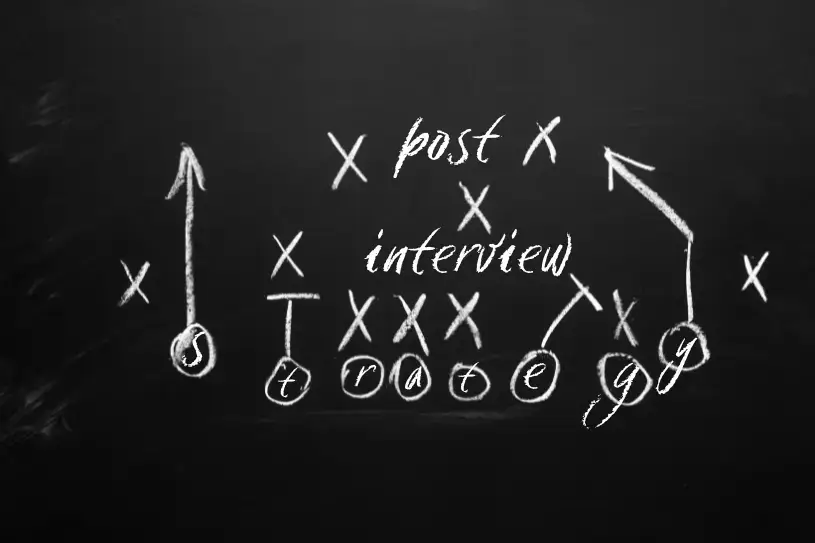
What you do after the job interview can be as important as the interview itself. Effective follow-up demonstrates your continued interest and professionalism while keeping you top-of-mind with employers.
Effective Thank-You Email Templates
Send a personalized thank-you email within 24 hours:
Sample template:
Subject: Thank You for the [Position] Interview
Dear [Interviewer’s Name],
Thank you for taking the time to discuss the [Position Title] role with me today. I especially appreciated learning about [specific topic discussed] and how your team approaches [particular challenge or project].
Our conversation reinforced my enthusiasm for contributing to [company name] through my experience in [relevant skill/experience you discussed]. As mentioned during our discussion, my background in [specific relevant achievement] aligns well with your team’s goals to [company objective discussed].
I’m looking forward to the possibility of bringing my [key strength] to your team and am happy to provide any additional information that might be helpful as you make your decision.
Thank you again for your consideration.
Warm regards,
[Your Name]
[Your Contact Information]
Appropriate Follow-Up Timeline
Strike the right balance between interested and respectful:
- Send thank-you email within 24 hours
- Wait for the timeline they provided before following up
- If no timeline was given, a polite follow-up after 7-10 days is appropriate
- Limit follow-ups to avoid appearing desperate
- Be mindful of time zone differences when timing your communications
Evaluating Job Offers and Contract Terms
Carefully assess any offer you receive:
- Compare all elements of the compensation package, not just the salary
- Verify that all verbal promises are included in the written contract
- Check for restrictive clauses that might limit future opportunities
- Ensure housing, transportation, and healthcare provisions are clearly defined
- Understand termination conditions and repatriation terms
- Verify working hours, overtime policies, and leave entitlements
- Consider having a legal professional review the contract if possible
Background Checking Your Potential Employer
Continue your due diligence even after receiving an offer:
- Search for recent news articles or press releases about the company
- Verify their business registration with appropriate authorities
- Check employee reviews on multiple platforms
- Connect with current employees through professional networks if possible
- Verify their compliance with labor laws in their country
- Confirm they have proper authorization to hire foreign workers
Gracefully Handling Rejection
If you don’t receive an offer:
- Respond professionally, thanking them for the opportunity
- Request constructive feedback when appropriate
- Ask to be considered for future opportunities
- Reflect on the experience to identify areas for improvement
- Maintain the relationship for potential networking opportunities
- Continue refining your approach for future job interviews
Legal Considerations and Red Flags to Watch For
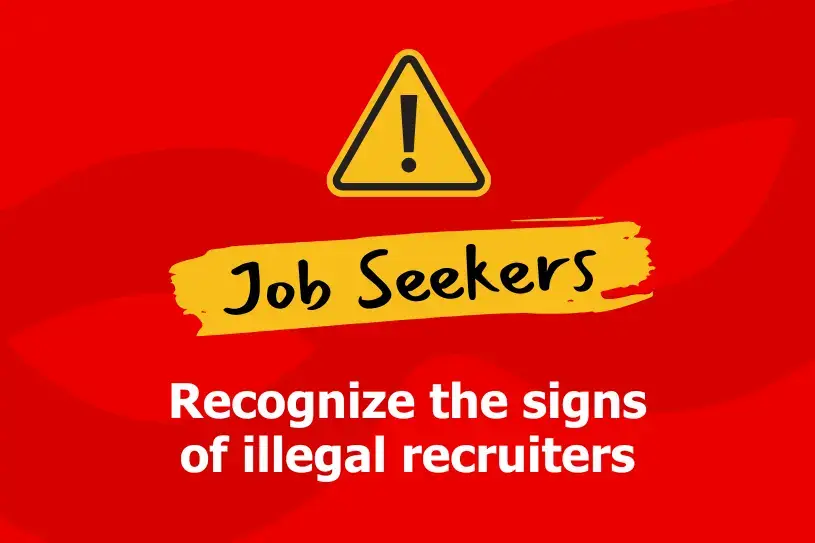
Protecting yourself from scams and exploitative situations is crucial when pursuing overseas employment. Understanding the legal framework and recognizing warning signs can save you from difficult circumstances.
Identifying Legitimate Job Opportunities vs. Scams
Protect yourself by recognizing these red flags:
- Requests for payment during any part of the application process
- Job offers without a proper interview or with minimal screening
- Pressure to make quick decisions or sign contracts immediately
- Vague job descriptions or responsibilities
- Promises of unusually high salaries compared to industry standards
- Communication only through personal email accounts rather than company domains
- Suspicious or unprofessional social media presence
- Reluctance to provide written contracts or detailed terms
Understanding Contract Terms Specific to Overseas Work
Pay special attention to these critical elements:
- Contract duration and renewal conditions
- Probationary period terms and conditions
- Working hours and overtime compensation
- Accommodation details and associated costs
- Healthcare coverage specifics
- Transportation allowances and arrangements
- End-of-service benefits and calculations
- Repatriation provisions in case of emergencies
- Visa sponsorship responsibilities
DMW Requirements and Protections
The Philippine Overseas Employment Administration provides crucial protections:
- Verify that your recruitment agency is DMW-licensed
- Ensure your contract is DMW-verified before departure
- Understand the mandatory insurance coverage requirements
- Complete the Pre-Departure Orientation Seminar (PDOS)
- Register with the Overseas Workers Welfare Administration (OWWA)
- Know your rights under the Migrant Workers Act
- Understand how to contact Migrant Workers Offices (MWOs) in your destination
Warning Signs of Exploitative Employment Terms
Be alert to these potential issues:
- Passport retention by employers
- Undefined or excessive working hours
- Restrictions on communication or movement
- Unclear job descriptions that could lead to scope creep
- Salary delays or irregular payment schedules
- Unauthorized deductions from promised compensation
- Sub-standard living conditions
- Isolation from other Filipino workers or support networks
Resources for Verifying Employer Legitimacy
Utilize these resources before accepting any position:
- DMW’s official website for licensed recruitment agencies
- Migrant Workers Offices in your destination country
- Embassy or Consulate verification services
- Industry associations in your professional field
- OFW communities and forums for shared experiences
- Professional networking sites for company reviews
- Government labor departments in destination countries
Conclusion
Preparing for overseas job interviews requires dedication, research, and practice, but the opportunities for professional growth and financial stability make these efforts worthwhile. By thoroughly understanding the OFW interview process, mastering cultural adaptations, and presenting yourself professionally, you significantly increase your chances of securing valuable international employment.
Remember that each job interview is a learning experience. Even if you don’t receive an offer from your first applications, the insights gained will strengthen your approach for future opportunities. The international job market values persistence, adaptability, and continuous improvement—qualities that many OFWs naturally develop through their journey.
As you prepare for your job interviews, customize these strategies based on your specific target country, industry, and position. What works perfectly in one context may need adjustment for another. Stay informed about changing requirements and opportunities in your field by connecting with professional networks and OFW communities.
Most importantly, approach your international job search with confidence in your abilities and the value you can bring to employers abroad. Filipino workers are respected worldwide for their strong work ethic, adaptability, and professional skills. By thoroughly preparing and presenting yourself effectively, you position yourself to join the ranks of successful OFWs building rewarding careers around the globe.
Your international success story is waiting to be written. Join the thousands of OFWs who have already transformed their lives and careers abroad with our guidance and support. Reach out to us today.
Ready to apply? Check out our job openings and submit your application today!





